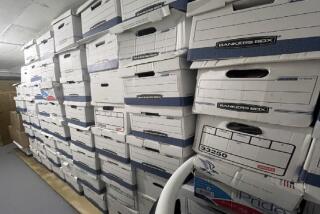Berlusconi prosecution loses round in L.A.
- Share via
In a move that could deal a serious blow to Italy’s prosecution of its former prime minister, Silvio Berlusconi, a federal judge in Los Angeles has ruled that authorities cannot use evidence recently seized from the home and office of a longtime Hollywood producer and co-defendant.
The extraordinary action by U.S. District Judge Dean D. Pregerson was requested by attorneys for producer Frank Agrama and agreed to by the U.S. attorney’s office in Los Angeles, which concluded that the FBI and Italian authorities did not properly safeguard confidential information.
As a result, the U.S. attorney’s office said, it had no choice but to agree that the evidence taken from Agrama in November be returned and not made available to Italian authorities, who are prosecuting Berlusconi, Agrama and 10 others on charges of tax fraud, embezzlement, false accounting and other charges. All the defendants have denied wrongdoing in the case, which is now in trial in Milan, Italy.
“This is a stinging rebuke of the Italian prosecutor’s unlawful and reprehensible conduct,” said Alejandro N. Mayorkas, one of Agrama’s attorneys and the former U.S. attorney in Los Angeles.
“It is my firm belief that the Italian prosecutor designed a strategy to seize and review our client’s trial preparation and other privileged materials because the trial was about to start,” Mayorkas said.
In Italy, prosecutor Fabio De Pasquale denied that he or his investigators acted improperly during the search. “There [was] no wrongdoing,” he said in an interview Wednesday.
The court’s order in Los Angeles, he added, could do “very, very serious damage for the investigation.”
Berlusconi, Italy’s richest man, has been under investigation in that country for years.
In a sworn affidavit last fall, an FBI agent said Italian authorities had been asking U.S. prosecutors for help as far back as May 2003. The latest request came in July, according to court documents, when Italy asked U.S. authorities to search the business and home of Agrama, who already was a defendant in the case.
In his affidavit, the FBI agent said the Italian prosecutor sought records from Paramount Studios about Mediaset, a subsidiary of Berlusconi’s media conglomerate, Finivest, which operates in television, advertising, publishing and insurance.
The prosecutor, the affidavit said, found it “suspicious” that Berlusconi and his media companies exerted “significant control” over Agrama’s companies and that the price of television rights increased dramatically from when Agrama’s companies purchased them until they were sold to Berlusconi’s companies.
In recent court papers, Assistant U.S. Atty. Jason P. Gonzalez said the alleged arrangement ran from at least 2002 through 2005 and allowed Agrama to buy television rights from production companies and then sell them to Berlusconi’s Mediaset, providing large kickbacks to Mediaset executives once the deals were completed.
From 1998 to 2002, according to one analysis prepared for Italian authorities, Agrama’s companies bought film rights, usually from Paramount, for about $130 million and then sold essentially the same rights to Mediaset companies for about $315 million, court records show. The court documents also cite bank records showing that Agrama’s companies sent nearly $6.5 million to Mediaset executives involved in buying the film rights.
In seeking the records from Agrama’s home and business, Italian authorities were apparently seeking evidence that would not be subject to statute-of-limitation issues because the records involved transactions within the last several years.
But Agrama’s attorneys challenged the legality of the search and how it was conducted, alleging that the Italian prosecutor and his investigators improperly examined confidential documents and other materials that Agrama was planning to use in his defense. Federal prosecutors and the FBI eventually concluded that “mistakes” had been made in the search, court papers show.
The errors, prosecutor Gonzalez said in documents, included FBI agents allowing Italian authorities access to materials that contained attorney-client information and agents not reviewing every page of the material they provided to Italian investigators as required to protect information that was beyond the scope of the case.
The FBI and the U.S. attorney’s office declined comment.
Times correspondent Livia Borghese in Rome contributed to this report.
More to Read
The biggest entertainment stories
Get our big stories about Hollywood, film, television, music, arts, culture and more right in your inbox as soon as they publish.
You may occasionally receive promotional content from the Los Angeles Times.










